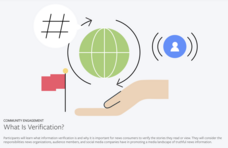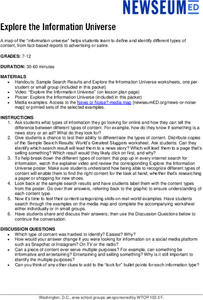Facebook
Versions of Media Texts
Verification of provenance and the original source of an image or video can be a long and winding process. Young journalists learn about the difficulty of finding the original source of a scrape, a copy of an original news story, and...
Facebook
The Verification Steps
Provenance, source, date, location, and motivation. High schoolers learn how to verify the authenticity of news stories and posts by following a seven-step process. They then use the strategy to determine the original site that posted a...
Facebook
What Is Verification?
One of the most important skills news consumers and social media users must develop is the ability to determine the veracity of stories they read or view. Here's an interactive lesson plan that teaches high schoolers how to verify news...
Newseum
Is This Story Share-Worthy?
Young journalists use a "Is This Story Share-Worthy?" flowchart graphic to decide whether a story is worth sharing online. Instructors provide groups with fake news, poor quality stories, opinion pieces, biased news, and high-quality...
Newseum
Explore the Information Universe
Distinguishing among different types of content when conducting online searches can be a challenge. An informative resource helps researchers identify different types of content, from fact-based reports to ads, from propaganda to satire....
British Council
Online Safety for Teenagers
Safety in a cyber world is complex but important. Scholars review ways to stay safe online by first writing words given by the teacher. Learners analyze the words to guess the topic of the lesson plan. They then read an online safety...
Newseum
Search Signals: Understanding Your Top Hits
Class members watch a short video about the criteria used to drive search results to learn about how search engines work. Scholars use a "Search Signals" worksheet and a tip sheet to record information as they conduct a simple search of...
News Literacy Project
Fact-Check It!
Here's a lesson designed to help learners develop their digital verification skills. First, expert groups study specific digital verification skills, and in a jigsaw activity, share what they have learned with classmates. The jigsaw...
Health Smart Virginia
Social Networking and You
The positive and negative impacts of social networking are the focus of a powerful lesson for high school freshmen. Class members explore the risks of oversharing online and watch a video of one girl's experience. The lesson ends with...
Health Smart Virginia
Networking
Sometimes it really is about who you know. High School freshmen engage in a series of activities to learn about the importance of networking.
Health Smart Virginia
Cyber Tattoo
Designed to inform high school freshmen about the ramifications of sharing personal information through social media, this lesson focuses on sexting. Investigators first check the validity of websites using a Website Evaluation Tool....
Health Smart Virginia
Socially Conscious Social Networking
A powerful, award-winning video launches a lesson about socially conscious social networking. After watching the video and engaging in a full class discussion, individuals share their ideas about healthy social networking in a podcast or...
Health Smart Virginia
Be Smart with Smartphones (and Screens)
Would you rather have a broken phone or a broken bone? This very engaging question launches a discussion about the smart use of smartphones and screens. Young scholars watch a series of videos, complete worksheets, and engage in...
Health Smart Virginia
Cyber Tattoo
Sophomores use a website evaluation tool to determine if their selected websites are valid and reliable. They read about and list three behaviors about taking and sending photos of minors that qualify as Class 1 misdemeanors in their...
Nemours KidsHealth
Online Safety: Grades 6-8
Recognize risky behaviors and avoid them! That's the big idea behind two activities designed to teach middle schoolers to think critically about online safety. After reading background articles about protecting online identity,...
Nemours KidsHealth
Screen Time: Grades 6-8
How much screen time is too much screen time? Even before COVID, tweens were spending hours watching TV, playing video games, and connecting with their friends by smartphone and computers. Two activities from Kids Health get young...
Nemours KidsHealth
Cyberbulling: Grades 6-8
Cyberbullying is the focus of two lessons. First, scholars discuss what cyberbullying is, and examine a problem-solving approach to handling cyberbullying, then create brochures on the topic. Second, pupils discuss the effects...
Norton Life Lock
Digital Citizenship Bingo
Bingo! Tweens demonstrate their knowledge of the nine D's of digital citizenship by playing the game of Bingo. As instructors call out questions, individuals search their game cards to locate the answering image on their card.
Norton Life Lock
Digital Citizenship Jeopardy
Fake News & Clickbait, Privacy, Tech & the Internet, Cyberbullying, and Ethics & Netiquette are the categories in a Jeopardy game that tests the class's knowledge of Digital Citizenship.
Norton Life Lock
The Nine Ds of Digital Citizenship
A reference page identifies the nine Ds of digital citizenship—digital access, etiquette, commerce, responsibilities, literacy, law, communication, security, health, and wellness.
Teaching Tolerance
Social Media for Social Action
Engage in activism, not slacktivism! Scholars discuss social media and the Internet as tools for social change. Next, they engage in a close reading strategy called Thinking Notes as they read an article about social media activism.
Teaching Tolerance
Advertising on the Internet
Believe it or not, everyone plays a role in Internet advertising. Scholars explore the topic with a podcast about Internet advertising and personal identity. Next, partners plan and produce their own public service announcements to...
Teaching Tolerance
Digital Activism Remixed: Hashtags for Voice, Visibility and Visions of Social Justice
It's time to discover hashtag activism! Using an engaging resource, learners explore viral hashtag campaigns relating to diversity, identity, and justice. Next, they either design their own hashtag campaigns or respond to existing ones.
Teaching Tolerance
The Privacy Paradox
What's more important: privacy or convenience? Scholars consider the question as they take a digital privacy quiz and read a transcript of an NPR podcast about the privacy paradox. As a culminating activity, pupils develop a list of five...

























